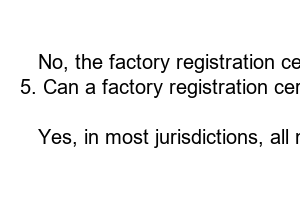공장등록증 발급
Issuance of Factory Registration Certificate: Ensuring Compliance and Safety in Manufacturing Facilities
Are you planning to establish a new factory or expand an existing one? Whether you’re venturing into the manufacturing industry for the first time or seeking to enhance your production capabilities, obtaining a factory registration certificate is a crucial step. In this blog post, we will delve into the significance of this document, the process of obtaining it, and the benefits it brings to your business.
Understanding the Factory Registration Certificate
A factory registration certificate, also known as an industrial license, is a legal document issued by government authorities that permits the operation of a manufacturing facility. This certification is typically acquired to ensure that factories comply with safety and environmental regulations, maintain necessary hygiene standards, and employ ethical working practices. It signifies that your factory is legally authorized to produce goods and guarantees its adherence to recognized standards.
The Process of Acquiring a Factory Registration Certificate
1. Identify the Regulatory Authority:
The first step is to determine the appropriate regulatory authority responsible for issuing factory registration certificates in your jurisdiction. Contact them to understand the necessary requirements and procedures.
2. Compilation of Documents:
Prepare the required documents, such as the factory’s layout plan, proof of ownership or lease, and details of machinery and equipment used.
3. Submission of Application:
Submit your application along with the necessary documents to the regulatory authority. Ensure that all the information provided is accurate and complete to avoid any delays or rejections.
4. Inspection and Assessment:
After receiving the application, the regulatory authority will conduct an on-site inspection to assess the compliance of your factory with safety and environmental standards.
5. Compliance Measures:
If any non-compliance issues are identified during the inspection, take prompt actions to rectify them. This may involve implementing safety measures, improving infrastructure, or addressing any other concerns raised by the regulatory authority.
6. Provisional Approval:
Once your factory meets the necessary requirements, you will be granted a provisional approval, allowing you to commence operations on a trial basis.
7. Final Approval and Issuance:
After a stipulated period of successful trial operation and inspections, a factory registration certificate will be issued, validating your factory’s compliance with regulations and authorizing its official operation.
Benefits of Obtaining a Factory Registration Certificate
1. Legal Compliance:
Holding a factory registration certificate ensures that your manufacturing operations are legally compliant, protecting your business from penalties, fines, and closure.
2. Enhanced Credibility:
Possessing this certificate enhances your business’s credibility and reputation, demonstrating your commitment to maintaining high standards and ethical practices.
3. Improved Safety Standards:
The stringent regulations associated with the certification promote workplace safety and reduce the risk of accidents or injuries, safeguarding both your employees and your property.
4. Access to Government Support:
Having a factory registration certificate opens doors to various governmental schemes, incentives, and support available exclusively for registered manufacturing units.
5. Customer Trust and Market Expansion:
Customers are increasingly conscious of the quality and ethical standards upheld by manufacturers. A factory registration certificate helps build trust among customers, encouraging them to choose your products over others in the market.
6. Seamless Business Operations:
Acquiring the certificate streamlines your business operations, as it ensures compliance with regulations from the outset and eliminates potential delays or interruptions caused by non-compliance issues.
Summary:
Obtaining a factory registration certificate plays a pivotal role in ensuring the compliance, accreditation, and safety of your manufacturing facility. This blog post highlighted the importance of this document, explaining the process of acquiring it and the advantages it offers, including legal compliance, improved safety standards, enhanced credibility, access to government support, customer trust, and seamless business operations. By understanding the significance of a factory registration certificate, you can set up a manufacturing facility that meets regulatory requirements and enjoys a competitive edge in the market.
FAQs:
1. How long does it take to acquire a factory registration certificate?
The timeframe for obtaining a factory registration certificate varies depending on the jurisdiction and the complexity of your manufacturing facility. It can take anywhere from a few weeks to several months.
2. Can I operate my factory without a registration certificate?
It is illegal to operate a manufacturing facility without a factory registration certificate. Doing so may lead to severe legal consequences, including fines, penalties, or even closure of the facility.
3. What are the consequences of non-compliance with regulations?
Non-compliance with regulations can result in legal action, fines, penalties, and damage to your business’s reputation. It can also compromise the safety of your employees and the environment.
4. Is the factory registration certificate a one-time requirement?
No, the factory registration certificate is typically valid for a specific period, after which it needs to be renewed to ensure continued legality of your operations.
5. Can a factory registration certificate be transferred if the factory’s ownership changes?
No, a factory registration certificate is not transferrable. If the ownership of the factory changes, the new owner must initiate the process to obtain a new certificate.
6. Are all manufacturing facilities required to obtain a factory registration certificate?
Yes, in most jurisdictions, all manufacturing facilities, regardless of their scale of operations, are required to obtain a factory registration certificate to ensure compliance with safety and environmental standards.

